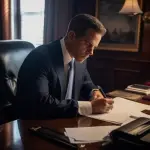The legal saga of former President Donald Trump took another turn as his federal election fraud charges re-entered the courtroom spotlight. The case returned to the U.S. District Court for the District of Columbia just after a seven-month hiatus, during which the Supreme Court was busy deciding whether presidents enjoy more lip service than actual legal protections when it comes to accountability. Spoiler alert: they do not. With Judge Tanya Chutkan, an Obama appointee known for her less-than-conservative leanings, back in action, conservatives were once again reminded that the Deep State isn’t just a conspiracy theory; it’s also a career path.
In a ruling that could be interpreted as a slight win for Trump, the Supreme Court determined that while presidents have immunity for official acts, they are as vulnerable as the average Joe for anything deemed unofficial. The implication here is simple: Trump’s presidency is likely the most scrutinized in history, and if anything, he might actually have a case to make about being unfairly targeted for simply doing his job—after all, he wasn’t the one who said he’d be “like a hot knife through butter” in draining the swamp.
News:
Judge Chutkan grants the prosecution's request to start briefing immunity issues on Sept. 26 — spelling possible revelations about Trump's efforts to subvert the last election before this one.
Scheduling order here 🔗 https://t.co/6kZXK1L9eH pic.twitter.com/2ijWiZOVDe
— Adam Klasfeld (@KlasfeldReports) September 5, 2024
The feds, in a move that feels more akin to a tap dance than actual legal progress, revised the original indictment slightly. They trimmed down the parts relating to Trump’s chats with the Justice Department and decided to keep all four original charges alive, which sound like a list of bad ideas straight out of a dystopian novel: conspiracy to defraud the United States, conspiracy to obstruct an official proceeding, and more conspiracy than a secret society meeting.
Despite not appearing in court, Trump’s legal team pleaded not guilty to all charges on his behalf. They argued that the Supreme Court’s ruling on presidential immunity meant the case against Trump had all the solidity of wet tissue paper. His attorney even suggested that the indictment might as well have been written in crayon. Naturally, this had the defense wanting to take the lead on filing motions, because who wouldn’t want first dibs when you’re facing a legal gauntlet crafted by the government’s finest?
Oh, but the government wasn’t going to let Trump’s team have it all their own way. They proposed filing their opening brief first to tackle immunity issues all at once—a classic bureaucratic maneuver that drags things out longer than a filibuster against a common-sense bill. The judge, Chutkan, with a flair for the dramatic, firmly stated that the looming election would not influence her decisions, because apparently, a critical moment in American history is just another Tuesday for her.
In a delightful twist to this legal circus, Trump’s defense plans to use the recent Supreme Court ruling in a separate case to mount a substantial challenge against the foundation of the charges—allegedly stretching the bounds of laws created to curb specific misbehavior as peeking through a keyhole might. If they win this argument, Trump might just bump shoulders with the legal equivalent of a victory lap, leaving his opponents scrambling while they forget how to play nice in the sandbox. Meanwhile, the government, apparently unaware that time is of the essence, suggested tying all immunity discussions together—because why not create a one-stop shop for all things inconvenient for Trump?
As this case continues to unfold, it’s nearly impossible not to recognize the political undercurrents coursing through every courtroom decision. It seems the only thing more contentious than the trial itself is what comes next for the former president as he navigates a field filled with landmines, fraught with liberal judges and the ever-elusive goal of a fair judicial process. As the legal wheels turn slowly, one thing remains clear: the courtroom is becoming increasingly reminiscent of a gladiator arena, and Trump continues to be the main event.




